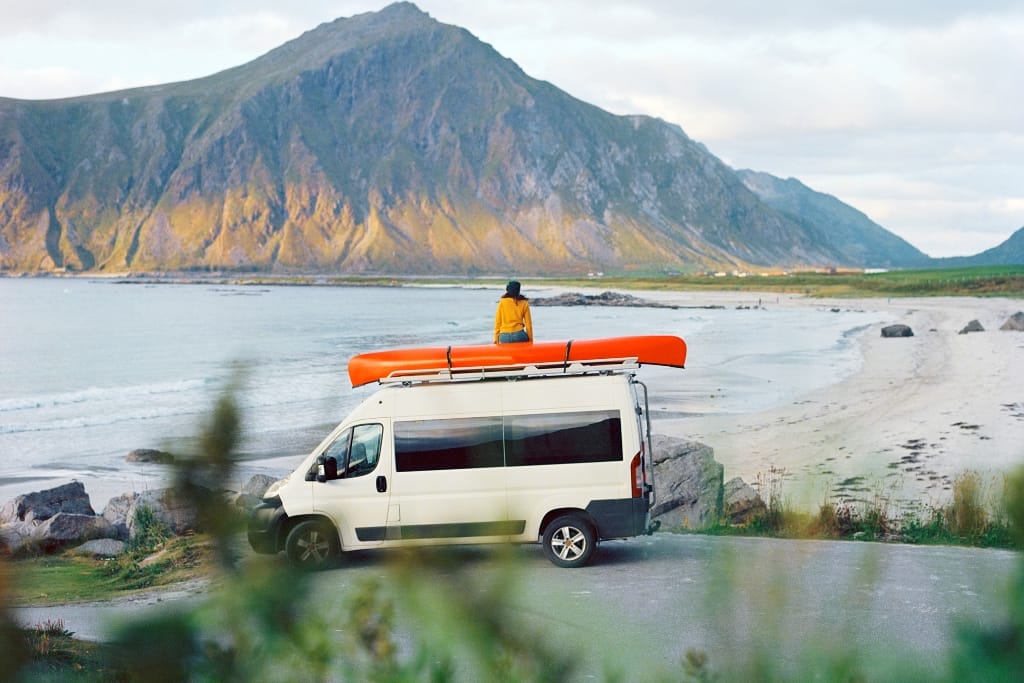Choosing the camper van lifestyle is an opportunity to reinvent your daily experience and fully embrace a life defined by freedom and flexibility.
It’s about prioritizing the things that truly matter to you—whether that’s connecting with nature, simplifying your possessions, or creating space for personal growth.
Yet, this significant shift in lifestyle requires thoughtful consideration.
Understanding how this choice aligns with your goals, values, and practical needs is key to making it work.
By reflecting on key aspects such as your mindset, finances, and long-term vision, you can approach this decision with clarity and confidence.
Start by asking yourself the right questions to determine if this lifestyle is a perfect fit for you.
1)) Why Do I Want This Lifestyle?
Transitioning to the camper van lifestyle is a deeply personal decision that often stems from a desire to live more intentionally.
For some, it’s about the allure of adventure, waking up to new landscapes, and exploring the world on their terms.
For others, it’s a way to escape the conventional routines and pressures of modern life, prioritizing simplicity and freedom over material possessions.
It’s important to reflect on what motivates you—whether it’s the chance to foster a stronger connection with nature, achieve financial independence, or experience personal growth through new challenges and experiences.
Understanding your true reasons will not only help you commit to this way of living but also shape the direction and purpose of your camper van journey.
2)) Can I Afford The Expenses?
Living the camper van lifestyle can be rewarding, but it’s essential to take a realistic look at your financial situation to ensure it’s sustainable.
While this lifestyle often reduces traditional housing costs, it introduces its own set of expenses, such as the purchase or conversion of a van, fuel, maintenance, insurance, and campground fees.
These costs can vary widely depending on your travel habits, the type of van you choose, and how much you prioritize comfort and convenience.
It’s also important to account for unexpected repairs or emergencies, which can quickly add up.
Consider how you’ll generate income on the road, whether through remote work, savings, or other means.
Taking the time to create a detailed budget and evaluate your financial stability will provide peace of mind and help you enjoy the experience without unnecessary financial stress.
3)) What Size Van Suits My Needs?
Choosing the right size van is one of the most critical decisions when embarking on the camper van lifestyle.
The size of your van will directly impact your daily comfort, mobility, and overall experience on the road.
If you’re traveling solo or as a couple, a smaller van might provide the flexibility and ease of maneuverability needed for navigating narrow streets or remote trails.
On the other hand, families or those requiring more amenities may benefit from a larger van with extra sleeping space, storage, and room for kitchen or bathroom facilities.
Consider your must-have features, such as workspace for remote jobs or outlets for powering devices, and assess how much space you truly need versus what might feel excessive.
Pay attention to how the van layout accommodates your lifestyle preferences and whether it aligns with your travel goals.
By carefully evaluating your specific requirements, you can select a van size that strikes the perfect balance between practicality, comfort, and freedom.
4)) How Will I Earn Income?
Creating a reliable income stream is essential for sustaining the camper van lifestyle and ensuring long-term stability.
Many individuals rely on remote work opportunities known as Side Hustles, leveraging skills in fields such as writing, graphic design, software development, or digital marketing to maintain financial independence while traveling.
If you prefer a more hands-on approach, seasonal work or gig-based jobs in the areas you visit—such as photography, tutoring, or freelancing—can provide both income and a way to connect with local communities.
Another option is turning a passion or hobby into a source of revenue, such as selling handmade goods, offering online courses, or starting a blog or YouTube channel to share your van life experiences.
Consider diversifying your income streams to protect against fluctuations and ensure flexibility in your travel plans.
Carefully planning how you’ll earn money while living on the road is a key step in achieving a fulfilling and stress-free camper van lifestyle.
5)) Where Will I Park Or Camp?
Finding suitable places to park or camp is a crucial aspect of the camper van lifestyle, as it directly impacts your safety, comfort, and overall experience.
There are numerous options to choose from, ranging from established campgrounds with amenities like showers and power hookups to dispersed camping spots in national forests or Bureau of Land Management (BLM) areas offering solitude and a closer connection to nature.
When planning where to park or camp, research the rules and regulations for each location to avoid fines or disturbances, as some areas may have time limits or restrictions on overnight stays.
Apps and online resources can be invaluable for discovering free or low-cost sites, including community recommendations and reviews.
Consider the practical aspects, such as proximity to essential services like grocery stores or fuel stations, cell signal coverage for staying connected, or access to water and waste disposal facilities.
Balancing convenience, cost, and the type of environment you desire will help you build a parking strategy that supports your camper van lifestyle and ensures an enjoyable and stress-free experience on the road.
6)) Do I Need A Shower Or Toilet?
Deciding whether to include a shower or toilet in your camper van is a highly personal decision that depends on your individual needs, preferences, and travel style.
Having these facilities on board can significantly enhance convenience, allowing you to maintain hygiene and comfort without relying on public restrooms or campground amenities.
A built-in toilet, whether a cassette, composting, or portable model, provides privacy and eliminates the need to search for facilities in unfamiliar areas.
Similarly, a compact shower setup can be invaluable, particularly if you plan to camp in remote locations without access to external amenities.
However, including these features often requires sacrificing valuable space within the van and may add to your budget due to installation and maintenance costs.
Alternatively, many camper van travelers choose to utilize gym memberships, public facilities, or outdoor solar showers to meet their bathing needs.
Weighing the pros and cons of onboard facilities against your budget, travel plans, and the size of your van will help you determine whether a shower or toilet is a necessity for your particular adventure.
7)) How Will I Stay Connected?
Staying connected while living the camper van lifestyle is crucial for work, communication, and accessing resources during your travels.
Many van lifers rely on mobile data plans with portable Wi-Fi hotspots to maintain internet access, even in remote locations.
It's important to research coverage maps and select a provider that offers reliable service in the areas you plan to visit.
Investing in a signal booster can also help maximize connectivity in more rural or off-grid regions.
For those frequently traveling abroad, international SIM cards or global data plans can be valuable for staying online.
Beyond internet connectivity, staying connected to loved ones often involves regularly updating them on your location and plans through phone calls, video chats, or social media updates.
It’s also wise to carry offline resources, such as maps or pre-downloaded guides, to ensure you can access critical information if a connection is temporarily unavailable.
Balancing technology and meaningful communication will help you remain connected to the world while enjoying your camper van adventures.
8)) Is My Vehicle Reliable Enough?
Ensuring that your vehicle is reliable enough for the camper van lifestyle is essential for your safety, travel plans, and overall peace of mind.
A dependable vehicle reduces the risk of breakdowns and costly repairs, particularly if you plan to explore remote areas where access to mechanics or replacement parts might be limited.
Start by thoroughly inspecting the van before your travels, addressing any existing mechanical issues, and staying up-to-date on routine maintenance tasks like oil changes, tire rotations, and brake checks.
Consider having a professional assess the van's engine, transmission, and suspension systems to confirm they are in good working condition.
Carrying a basic set of tools, spare parts such as belts and hoses, and supplies like motor oil, coolant, and a tire repair kit can help you handle minor issues on the road.
Familiarize yourself with the intricacies of your vehicle, so you can identify potential problems early and take preventive measures.
A well-maintained and roadworthy van will provide a solid foundation for your adventures, ensuring you can travel with confidence and enjoy the freedom of life on the road.
9)) What Essentials Do I Need?
Packing the right essentials for your camper van lifestyle is key to ensuring a smooth and enjoyable experience on the road.
Start by identifying the basics—bedding, clothing, cooking equipment, and food storage solutions tailored to your specific space and travel needs.
A comfortable mattress or sleeping system, along with appropriate seasonal clothing, will keep you prepared for varying climates and conditions.
Kitchen supplies like a compact stove, utensils, a durable cutting board, and reusable containers can streamline meal preparation and minimize waste.
Don’t forget safety and maintenance essentials, such as a first aid kit, flashlight, fire extinguisher, and basic tools for repairs.
Power and energy are also crucial, so consider a portable power station, solar panels, or extra batteries to keep your devices and appliances running.
Since organization is essential in a small space, invest in bins, hooks, and other storage solutions that make the most of your van’s layout.
Finally, personal touches like books, games, or comfort items can help you feel at home while traveling.
By focusing on functionality and thoughtful planning, you can create a well-equipped setup that supports a stress-free and fulfilling mobile lifestyle.
10)) Am I Prepared For Isolation?
Adapting to isolation is an important aspect of the camper van lifestyle, especially if you plan to spend significant time in remote locations or away from regular social interaction.
While solitude can be peaceful and fulfilling, it also requires mental and emotional preparation to ensure it doesn’t become overwhelming.
Developing hobbies like reading, journaling, crafting, or learning new skills can help pass the time and keep your mind engaged.
Staying connected to loved ones through calls, messages, or video chats can provide comfort and prevent feelings of loneliness, even when you're far from home.
It's also essential to cultivate a strong sense of self-sufficiency by learning how to address basic challenges, such as repairs, navigation, or sourcing essentials, without immediate support.
Engaging in outdoor activities like hiking, photography, or stargazing can help you appreciate the beauty and serenity of remote living, transforming isolation into a rewarding aspect of your adventure.
By maintaining a positive mindset and creating routines that nurture your mental and emotional well-being, you can fully embrace the solitude and freedom that van life offers.
11)) How Long Can I Sustain This?
Sustaining the camper van lifestyle requires careful planning, honest self-assessment, and adaptability to ensure it is both viable and enjoyable in the long term.
Begin by evaluating your financial resources and creating a budget that accounts for essential expenses such as fuel, maintenance, food, insurance, and campground fees.
Consider alternative income streams like remote work, freelance opportunities, or seasonal jobs to maintain financial stability while traveling.
Physical and mental endurance are also key factors to consider, as constant movement and living in close quarters can take a toll over time.
Take steps to prioritize your health by maintaining a balanced diet, exercising regularly, and finding moments of rest both on and off the road.
Reflect on your personal goals and motivations for van life, as aligning your lifestyle with what truly fulfills you can provide the resilience you need to face challenges.
Be open to adjusting your plans or taking breaks from the road if needed, whether to recharge, regroup, or address unforeseen circumstances.
By staying realistic and flexible, you can craft a lifestyle that is not only sustainable but also deeply rewarding over the long haul.
Conclusion
The camper van lifestyle offers a unique blend of freedom, adventure, and self-discovery, allowing you to explore the world on your terms.
By understanding the key aspects of van life—from maintenance and essential supplies to preparing for isolation and ensuring sustainability—you can set yourself up for a rewarding experience.
It’s a way of life that challenges you to live more simply, connect with nature, and adapt to new situations, fostering skills and perspectives that extend far beyond the road.
Whether you’re seeking solitude in remote wilderness settings or building connections with a vibrant community of like-minded travelers, the possibilities are endless.
With thoughtful preparation, a resilient mindset, and a sense of wonder, van life can become more than just a mode of travel—it can be a deeply fulfilling way to live, explore, and grow.
Download Our Free E-book!







